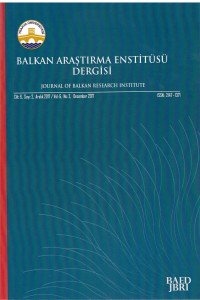Abstract
Türklerin Avrupa’ya ayak bastığı andan itibaren hoşgörüyle baktığı gayrimüslimler ile Müslümanların araları, 19. yüzyıl başlarından itibaren bozulmaya başlamış ve Balkan Savaşları’ndan sonra ise tamamen hasmane bir hal almıştır. Bu durum Bulgarlar, Yunanlılar ve Sırplar başta olmak üzere diğer etnik ve dinî gruplar arasında da gelişmiş, yoğun savaşların yaşanmasına sebep olmuştur. Savaşların öncesi ve sonrasında ise güvenli bölgelere doğru göçler meydana gelmiştir.
Türkiye Cumhuriyeti, Lozan Barış Antlaşması’ndan sonra muhacirler konusuna eğilme imkânı bulmuştur. Araştırmamız Konya örneğinde, Balkan savaşları esnasında ve sonrasında Türkiye’ye gelen, fakat iskânları gerçekleştirilememiş muhacirler ile yapılan birebir görüşmelerde tanzim edilen tutanaklara ve arşiv belgelerine dayanmaktadır. Mülkiye müfettişi Nusret Bey tarafından hazırlanan bu tutanaklar sayesinde, muhacirlere ve yaşanan sıkıntılara dair ayrıntılı bilgilere ulaşılmaktadır.
Keywords
References
- Arşiv Belgeleri
- BOA (Başbakanlık Osmanlı Arşivi). DH. ŞFR. (Dâhiliye Nezareti Şifre Evrakı) 104/90; 104/265; 104/287; 105/35; 105/93.
- BOA. DH.İ.UM. (Dahiliye Nezareti İdare-i Umumiye Evrakı) 50/25.
- BCA (Başbakanlık Cumhuriyet Arşivi). 272.11.13.44.6; 272.12.40.41.9; 272.12.41.46.2; 272.12.41.46.21; 272.12.43.62.17; 272. 12. 44.65.23; 272.12.45.78.6;272.14.75.24.6;272.71.32.40.7; 030.10.26.149.9.
- BCA. Kod:271, Defter No: 15, Muhacir Esas Kayıt Defteri, İl: Konya, İlçe: Merkez, Tarih: 1924–1935.
- BCA. Kod:271, Defter No: 16, Muhacir Esas Kayıt ve Sevk Defteri, İl: Konya, İlçe: Merkez, Tarih: 1920.
- Kitaplar ve Makaleler
- BAHADIR, Sedat, Büyük Reyhanlı Aşireti ve Bahadırlar, Sonçağ Yayınları, 2. Baskı, Ankara 2017.
- DEVELLİOĞLU, Ferit, Osmanlıca-Türkçe Ansiklopedik Lûgat, Aydın Kitabevi Yay., Ankara 1993.
- KURTULGAN, Kürşat, Balkan Muhacirlerinin Konya Vilayetine İskânı, Çizgi Kitabevi, Konya 2010.
- İPEK, Nedim, İmparatorluktan Ulus Devlete Göçler, Serander Yay., Trabzon 2006.
- Dr. Nazmi, Türkiye’nin Sıhhî-i İctimai Coğrafyası, Konya Vilayeti, Öğüt Matbaası, Ankara 1922.
- SEZEN, Tahir, Osmanlı Yer Adları, Devlet Arşivleri Genel Müdürlüğü Yay., Ankara 2006.
- SOYSAL, İsmail, Türkiye’nin Siyasal Andlaşmaları (1920-1945), I., TTK Yay., Ankara 2000.
- Şemsettin Sami, Kamûs-i Türkî, Çağrı Yay., İstanbul 1987.
- ŞİMŞİR, Bilal N., “Ermeni Gailesinin Tarihsel Kökeni Üzerine”, Ermeni Araştırmaları, ASAM Ermeni Araştırmaları Enstitüsü, Sayı 1, Ankara Mart-Nisan-Mayıs 2001, s. 108-128.
- TBMM. G.C.Z.C. (1985), IV., 2 Mart 1339 (1923) - 25 Teşrinievvel 1934, Türkiye İş Bankası Kültür Yayınları, 2. Baskı, Sanem Matbaası, Ankara.
Abstract
The relationships between non-Muslims, who have been treated with tolerance since Turks stepped into Europe and Muslims, started to deteriorate at the beginning of the 19th century, and took a completely hostile status after the Balkan wars. This situation also arose among other ethnic and religious groups, especially Bulgarians, Greeks and Serbians, and led to massive wars. Migrations to safe zones took place before and after the wars.
The Republic of Turkey found the opportunity to deal with the issue of emigrants after the Lausanne Peace Treaty. Our study on the example of Konya is based on records of one on one interviews conducted with immigrants who arrived in Turkey during and after the Balkan wars but were not resettled; and archived documents. Detailed information about emigrants and the problems they had experienced is reached through these records kept by Civil Inspector Nusret Bey.
Keywords
References
- Arşiv Belgeleri
- BOA (Başbakanlık Osmanlı Arşivi). DH. ŞFR. (Dâhiliye Nezareti Şifre Evrakı) 104/90; 104/265; 104/287; 105/35; 105/93.
- BOA. DH.İ.UM. (Dahiliye Nezareti İdare-i Umumiye Evrakı) 50/25.
- BCA (Başbakanlık Cumhuriyet Arşivi). 272.11.13.44.6; 272.12.40.41.9; 272.12.41.46.2; 272.12.41.46.21; 272.12.43.62.17; 272. 12. 44.65.23; 272.12.45.78.6;272.14.75.24.6;272.71.32.40.7; 030.10.26.149.9.
- BCA. Kod:271, Defter No: 15, Muhacir Esas Kayıt Defteri, İl: Konya, İlçe: Merkez, Tarih: 1924–1935.
- BCA. Kod:271, Defter No: 16, Muhacir Esas Kayıt ve Sevk Defteri, İl: Konya, İlçe: Merkez, Tarih: 1920.
- Kitaplar ve Makaleler
- BAHADIR, Sedat, Büyük Reyhanlı Aşireti ve Bahadırlar, Sonçağ Yayınları, 2. Baskı, Ankara 2017.
- DEVELLİOĞLU, Ferit, Osmanlıca-Türkçe Ansiklopedik Lûgat, Aydın Kitabevi Yay., Ankara 1993.
- KURTULGAN, Kürşat, Balkan Muhacirlerinin Konya Vilayetine İskânı, Çizgi Kitabevi, Konya 2010.
- İPEK, Nedim, İmparatorluktan Ulus Devlete Göçler, Serander Yay., Trabzon 2006.
- Dr. Nazmi, Türkiye’nin Sıhhî-i İctimai Coğrafyası, Konya Vilayeti, Öğüt Matbaası, Ankara 1922.
- SEZEN, Tahir, Osmanlı Yer Adları, Devlet Arşivleri Genel Müdürlüğü Yay., Ankara 2006.
- SOYSAL, İsmail, Türkiye’nin Siyasal Andlaşmaları (1920-1945), I., TTK Yay., Ankara 2000.
- Şemsettin Sami, Kamûs-i Türkî, Çağrı Yay., İstanbul 1987.
- ŞİMŞİR, Bilal N., “Ermeni Gailesinin Tarihsel Kökeni Üzerine”, Ermeni Araştırmaları, ASAM Ermeni Araştırmaları Enstitüsü, Sayı 1, Ankara Mart-Nisan-Mayıs 2001, s. 108-128.
- TBMM. G.C.Z.C. (1985), IV., 2 Mart 1339 (1923) - 25 Teşrinievvel 1934, Türkiye İş Bankası Kültür Yayınları, 2. Baskı, Sanem Matbaası, Ankara.
Details
| Primary Language | Turkish |
|---|---|
| Journal Section | Research Article |
| Authors | |
| Publication Date | December 29, 2018 |
| Published in Issue | Year 2017 Volume: 6 Issue: 2 |
For submission of articles to the JBRI: baedergisi@gmail.com
Creative Commons Attribution 4.0 International License 

